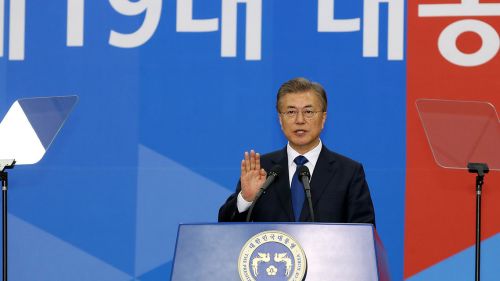Japanese Public Glad to See GSOMIA Stay In Place

We explore the tensions between two key US allies in Asia—Japan and South Korea—and what happened in 2019 that led the countries here.
Japan-South Korea Relations
2019 was a rough year for Japan-South Korea relations. The most recent downturn in relations began when the South Korean Supreme Court ruled in November 2018 that former wartime laborers would be allowed to sue Japanese companies for compensation. Japan argued that this move was a violation of the 1965 treaty re-establishing formal relations between the two countries.
Tensions between these two key US allies in Asia raised serious alarms in Washington in late August 2019 when South Korean President Moon announced he planned to terminate the General Security of Military Information Agreement (GSOMIA) agreement, which provides for intelligence sharing between Japan and South Korea. As American officials warned, terminating the agreement would affect US security and America’s ability to defend its South Korean ally.
But hours before the agreement was due to expire on November 22, Seoul pulled back from the brink, suspending its decision to terminate GSOMIA. A Kyodo News poll conducted November 23-24, immediately following the decision, found two-thirds of Japanese (66%) reported they were relieved that the termination had been avoided.
Avoiding this serious breach in Japan-Korea relations may have stopped the downward spiral, but prospects for improvement are less clear.
A December 6-8 NHK poll finds that six in ten Japanese (62%) do not think that Japan-Korea relations are going to improve, compared to 16 percent who think they will. When asked which country should compromise in order to improve relations, roughly half (49%) said both Japan and South Korea needed to compromise. Among the other half, three in ten (28%) pointed solely to South Korea, five percent solely to Japan, and 11 percent replied that improving Japan-Korea relations is unnecessary. And the pace of any improvement may be slow: according to a December 7-8 poll by JNN, two-thirds of Japanese (67%) say there is no urgent need to make concessions to improve the Japan-Korea relationship.
South Korean President Moon and Japanese Prime Minister Shinzo Abe are due to meet next week at a trilateral summit in Chengdu, China, their first formal summit in over a year. Improving relations will certainly be on the agenda. But the Japanese public is skeptical that the summit will help: in a December 13-15 Yomiuri Shimbun poll, only 16 percent think the coming summit between Abe and Moon will improve Japan-Korea relations, while three in four (74%) think it will not. It could be a long road to reconciliation.

